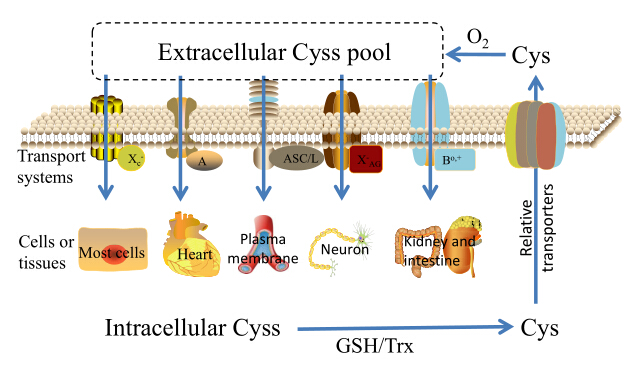L-Cysteine: Physiological and Nutritional Function in Host Health
What is GSH (glutathione)? In term of this question, maybe everyone will figure out more or less several functions in human being's heath because of its pleiotropic functions such as anti-oxidative stress, anti-aging. However, as for L-cysteine, maybe most of people hardly know its physiological and nutritional functions, except for people with biological background know L-cysteine is one of key components of GSH and proteins. In fact, in addition to precursor for GSH, L-cysteine also is a precursor for hydrogen sulfide (H2S), taurine, and has extensive physiological and nutritional functions in host health.
Currently, a research team led by Prof. YIN Yulong, from Institute of Subtropical Agriculture, Chinese Academy of Sciences (ISA) has reviewed the metabolic pathways of L-cysteine catabolism to GSH, H2S, and taurine, and corresponding nutritional implications in host health. L-cysteine is a nutritionally semi-essential amino acid. It is present mainly in the form of L-cystine in the extracellular space, but inside cells, L-cystine is reduced to L-cysteine by thioredoxin and reduced GSH with the help of a transport system mainly including systems A, ASC, L, Xc-,Bo, +, and X-AG (Fig. 1). Intracellular conversion of L-cystine into L-cysteine is a key process to mediate extracellular L-cysteine/L-cystine redox, as well as the synthesis of protein and GSH. Intracellular L-cysteine plays an important role in cellular homeostasis as a precursor for protein synthesis, and for production of GSH, H2S, and taurine by a series of enzymes.Imbalance of extracellular L-cysteine/L-cystine is associated with oxidative stress and other pathological disorders. L-cysteine-rich meals have shown positive effects in several pathological conditions, including oxidative stress, aging, type-2 diabetes, etc. "This research can widen the knowledge about the metabolism and nutritional function of L-cysteine in host health, and future research about L-cysteine should focus on the optimal requirements of L-cysteine by animals and humans, nutritional regulation of GSH, H2S, and taurine synthesis in a cell- and tissue-specific manner, and the roles of these metabolites to treat and prevent metabolic disorders."said by Yin Jie, one of the authors.
This study was supported by the National Natural Science Foundation of China (nos. 31272463, 31372319, 31402084, 31330075, 31110103909), Hunan Provincial Natural Science Foundation of China (no. 12JJ2014), the Hubei Provincial Key Project for Scientific and Technical I nnovation (no. 2014ABA022), the Hubei Hundred Talent Program, and Texas A&M AgriLife Research (H-8200).
The main findings of this study have published on Molecular Nutrition & Food Research. Details can be found at: https://www.ncbi.nlm.nih.gov/pubmed/25929483

Figure 1 . Extracellular and intracellular L-cysteine/ L-cystine balance and L-cysteine/ L-cystine transport systems. Glu, L-glutamate; Cyss, L-cystine; Cys, L-cysteine; GSH, glutathione; Trx, thioredoxin.(Image by YIN Jie)
Contact: YIN Yulong
E-mail: yinyulong@isa.ac.cn
Institute of Subtropical Agriculture, Chinese Academy of Sciences
Download attachments: